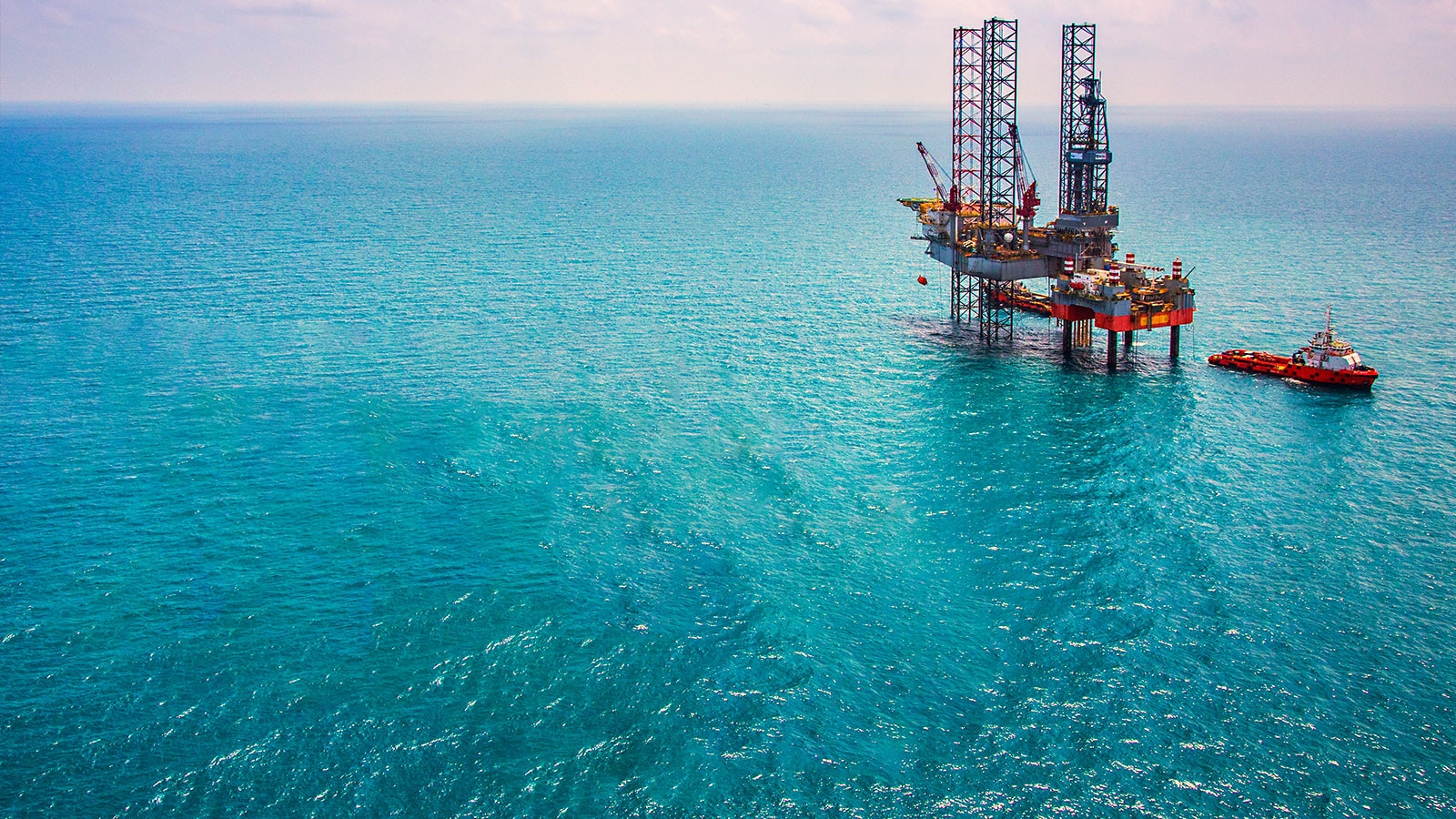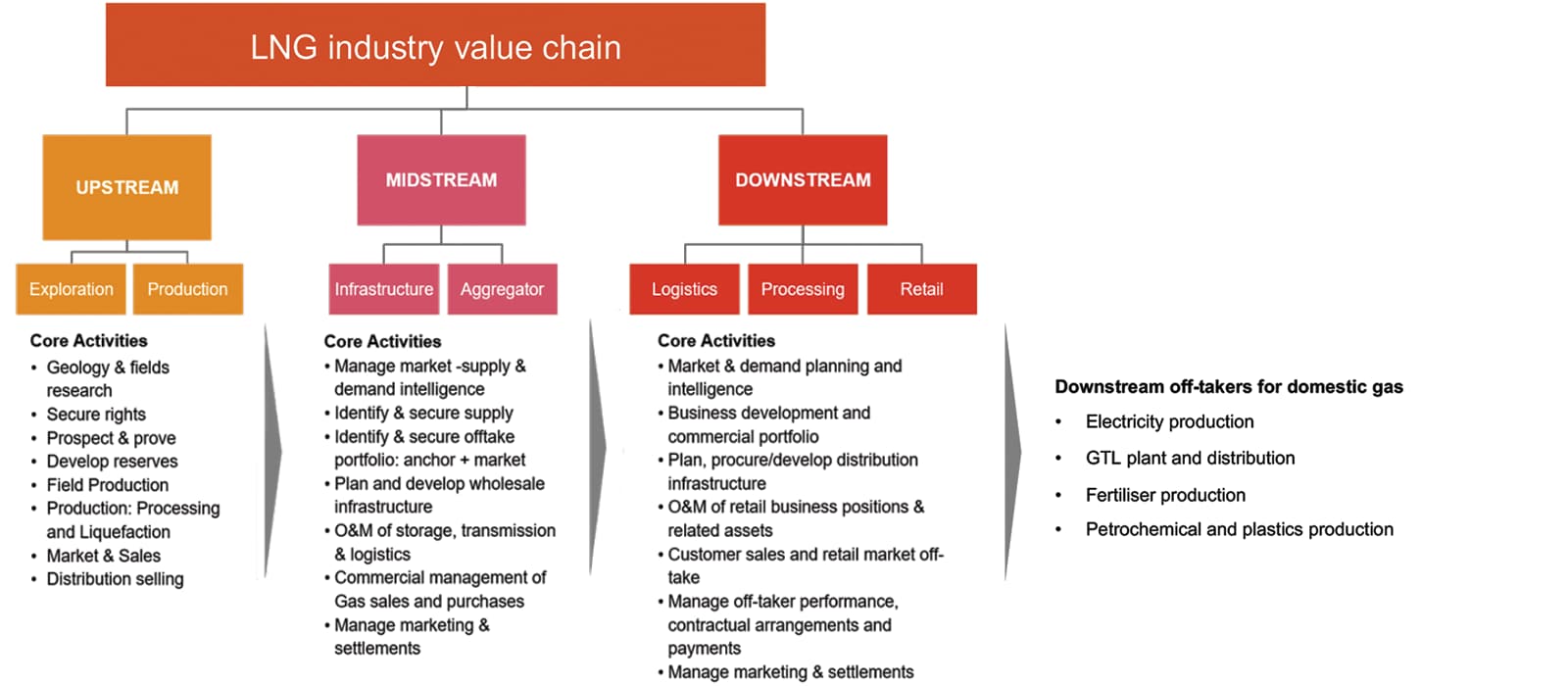{{item.title}}
{{item.text}}

{{item.text}}

The global energy market is in an exciting phase of transition and disruption. Decarbonisation, driven by the environmental sustainability agenda, is shifting the energy mix at an accelerating pace. This seems likely to position gas ahead of coal by 2030 to become the world’s number two fuel.
Liquefied Natural Gas (LNG) exports are introducing increased flexibility into global energy marketing and trading. The number and type of market participants have increased dramatically as lower prices make imports more affordable.
One of the most dramatic finds over the past decade is Mozambique’s natural gas, estimated at over 180 tcf, which has already unlocked the first three large-scale LNG projects. These projects, together with project expansion phases and additional exploration, have the potential to position Mozambique as the third-largest global LNG producer after Qatar and Australia by 2030.
Nothing breeds success like success, and the successful development of the new Mozambique projects could be a catalyst for the continent to finally capitalise on its potential.
The stage is set for a dynamic future for Africa’s hydrocarbon-rich and import-dependent countries, and for investors, NOCs and IOCs. Understandably, many players are reviewing their strategies, portfolios and ambitions in line with this changing context. Finding balance between risk, return, affordability and developmental impact in the near term and outer horizons will be defining for many.
Regardless of the region your company operates in, PwC will make use of our extensive global network (Spanning over 256 countries) to offer you informed, practical, innovative and experienced based solutions that effectively reflect the environment your company operates. We have a team that’s 100% dedicated to servicing the Liquid Natural gas sector. The commitment allows us to deliver assurance, consulting, deals and tax services catered to the unique needs of your business.
LNG exports are introducing increased flexibility into global energy marketing and trading. The number and type of market participants have increased dramatically as lower prices make imports more affordable.
Whether you are narrowly focused within a vertical segment, have operations across the value chain, are established or are considering market entry, we help clients like you to understand the value drivers that shape and enable your strategy, and maintain effective alignment between your strategic, operational, and support functions within the organisation. We also identify opportunities to optimise performance and reduce risks, build the capabilities needed to adapt to / pursue new business opportunities, raise capital, and achieve compliance. We deepen your strategic insights in a value chain segment, a geography, and a service/product set and help you identify and nurture better local relationships and strategic partnerships.
The global transition to cleaner energy, coupled with the oversupply of fossil fuels, price volatility and cost pressures, means that private and public sector O&G players are rethinking their strategies. S& has advised clients across the value chain on ‘where to play’. We draw on our own and wider industry and market data, providing deep insight to our clients regarding strategic market context and their choices. We have local networks and insights based on our longstanding presence in resource-rich countries – e.g. in Mozambique. We truly understand how to do business in these countries.
Many clients have benefited from our testing of their strategies against the impact of market shifts (e.g. energy mix, technological disruptions, climate change, trade patterns and demographics, new entrants, digital disruption, politics and changing regulation). We help clients understand gaps in their capabilities versus what’s required to win in this dynamic new market context. Our seasoned O&G strategists use our Capability-Driven Strategy approach, industry knowledge, data analytics, benchmarking and leading practice frameworks to determine ‘how to play’.
S& has helped many clients assess their business and project portfolios in terms of strategic alignment, commercial returns, risks, and developmental benefits. We work closely with our Deals team to build business cases, feasibilities and financial models to support investment committee and funding applications. We have developed portfolio modelling and management tools to help our clients manage interdependency, portfolio balance and risk exposure, governance, cash flows and returns.
We have assisted many clients in the LNG value chain to develop corporate, business and operational-level strategies and performance improvement plans. These range in focus from market entry, green field establishments, acquisitions and integration, to disposals, cost reduction, operating model transformation, digital transformation and innovation and growth. We use our SMEs (Subject Matter Expert), BXT (Business, eXperience, Technology) accelerator approach and facilities to help clients transcend the limitations of current thinking to reimagine the business of tomorrow.
We help clients design organisations that optimally use their resources and capabilities to achieve their strategic priorities, are focused on the customer, are agile and effective, are digitally fit, and are responsive to the SDGs. We help our clients build organisations that are Fit for the Future. We find that the volatile and disrupted energy and LNG market has exposed gaps in many of our clients’ current operating models. These outdated models need to be reinvented to prevent failure or redundancy.
Tax is an increasingly important consideration, and tax strategy is embedded in our strategic choices, market entry strategies, corporate and operating model designs – not added as an afterthought. Our S& team works seamlessly with our tax SMEs to consider and develop tax-efficient approaches and to design Tax Functions of the Future, which are able to deliver efficiencies and to ensure that the overall control environment is effective.
Once your strategy has been set and hypotheses drawn, PwC can provide a steering hand to identify the appropriate LNG opportunities for you to pursue. Identifying the right opportunity for you is critical to your success in the long run.
PwC assists with market entry and intelligence through our wealth of experience in the LNG industry. We are at the forefront of thought leadership and in the know regarding new opportunities in the market. This positions us well to assess what your market entry point should be and to provide the appropriate rationale for the point of entry. Part of the market entry strategy will be to decide whether a deal should be done or whether a partnership will be the most appropriate structure to enter the market.
Due to multiple external factors such as political, economic, and regulatory issues that can affect the long-term success of your LNG project and internal intricacies of the project, pre-feasibility and feasibility assessments are strongly advised, to ascertain whether your proposed project is feasible in the long run.
PwC is well positioned to review or help you build a business case around your identified LNG opportunity. Our Infrastructure, Government and Utilities team is experienced in running various scenarios with a wide variety of different input assumptions that affect the output of your business case.
As there are numerous aspects that impact the success of an LNG project, PwC assists LNG industry players with financial, taxation, legal, commercial, operational, environmental and people and organisational due diligence. Through insights gained through due diligence, you can make informed decisions around pricing, deal structure, legal contingencies and commercial and operational challenges.
Structuring a deal in the LNG industry can be challenging due to the intricacies of deals, as multiple stakeholders are involved. We are well positioned to provide financial, taxation and legal structuring advice across multiple jurisdictions in the LNG industry to ensure the long-term viability of the LNG project.
Obtaining the appropriate funding that suits your project’s return profile is crucial, as LNG projects’ capital outlay requirements can be cumbersome. PwC assists clients in obtaining the appropriate funding; whether it is through raising new finance, refinancing or restructuring of existing facilities or general financial advisory services, such as an independent debt review, treasury advice or buy-back of debt.
Sometimes unforeseeable factors result in businesses in the LNG industry facing challenging periods. PwC assists these businesses by carrying out a rapid business and strategic review to analyse the current financial position and root causes of problems. This allows for the identification and analysis of options and the eventual development and implementation of a strategic restructuring plan necessary for the possible return to the LNG market as a profitable player.
There are a number of areas that need to be attended to when a deal is executed; pricing negotiations, sale and purchase agreement terms to be agreed etc. PwC provides guidance and support to the LNG industry throughout the execution phase of a deal.
Paying the right price for your LNG investment is pivotal to ensure maximum shareholder value. PwC’s Valuation and Economics team takes specific LNG industry factors and specific project factors into account when assisting LNG industry players with their valuations. PwC can also provide fairness opinions for regulatory or corporate governance purposes.
Integrating an LNG project or company into your existing value chain can be challenging. The PwC delivery deal value team considers at least these five areas that often proves challenging when integrating or separating businesses; finance and tax, technology, people and change, operations and legal and compliance.
PwC assists LNG industry players to review any areas of concern you may have with your LNG project(s). PwC can also provide certain assurances such as agreed-upon procedures to provide a greater degree of comfort, depending on your requirements.
The development of enterprise performance management capabilities will enable LNG players to build up a much richer and up-to-the-minute picture of evolving consumer behaviour and the resulting opportunities. PwC assists LNG players to achieve cost savings by optimising their value chains. We do this by analysing their strengths and weaknesses, assessing strategic options and adapting their business models to the changing demands of the digital era.
PwC assists the LNG to prepare and embrace for the unequivocal rise of digital innovation, RPA (Robotic Process Automation), and IoT (Internet of Things) in the LNG industry. With our proven technology and automation solution we assist the LNG industry to reach higher production rates and increased productivity, more efficient use of materials, better product quality, improved safety, more favourable labour demands, and reduced lead times across all LNG operations. We help clients realise the change needed and ensure they have the skills, resources and flexibility to respond ahead of their competitors.
Our organisation design capability comprises services that help LNG clients design an organisation and set-up of their people that is fit for purpose and addresses the internal, external, formal and informal factors that determine how well an organisation can put into practice its strategy.
PwC assists the LNG industry to build tailored people and organisation solutions with a deep understanding of our clients’ uniqueness, grounded in rigorous analysis and data‑driven insight, to create lasting, differentiated value. We help clients to implement organisational transformation, improve the effectiveness of their workforce, develop and move talent around their business, and manage their human capital risks. We work from people strategy through to organisational execution.
PwC assists the LNG industry to improve energy usage and cost across all operations. We assists clients in ensuring that power is available, operational costs are optimised and maintenance is performed on a predictive, preventive basis and that our clients can track energy use and the potential for energy savings. Applying our demand side management approach we create revenues from our clients’ energy flexibility.
Globalisation, regulatory changes, shorter business cycles, increased scrutiny and the changing international tax landscape are factors affecting the tax functions of players in the LNG industry. With our proven tax expertise, we deliver value to organisations by assisting them to be well-positioned and able to respond to these challenges.
Oil and gas organisations identified safety, health, environment and quality (SHEQ) as one of the most significant factors that would affect their companies’ businesses over the short-term. PwC assists the LNG industry to identify and manage relevant environmental, human health and safety risks and issues which, when viewed in conjunction with regulatory changes, will result in consequences reaching beyond the financial burden of SHEQ risks.
Regulatory uncertainty has hampered the LNG industry and its players from reaching their full potential in recent years. PwC assists the LNG industry by taking a proactive approach to governance that involves determining what customers and their stakeholders want, over and above the minimum standards laid down by legislators and regulators. We improve the quality of an organisation’s management and decision-making abilities, and develop standards of governance that enable our clients to manage risks confidently, as they arise.
Risks related to the LNG industry are real, and although they can hinder growth and potentially be a source of demise, they can also drive growth and value creation for a company. In helping businesses understand and increase their ability to successfully manage risks, PwC helps them establish confidence in their ability to seek out and take those risks; risks that generate the greatest opportunities for their business.
Many organisations have processes in place to manage risk. But, they are often not as robust and forward looking as they need to be at the face of a complex LNG industry. From technology to climate change, from regulation and compliance to business operations, we look at our clients’ processes, policies, systems and controls with a fresh eye - helping them manage risk holistically to make informed decisions.
In today’s organisations, the ability to turn data into insights is critical to any successful cyber approach. Leading practice requires a cohesive relationship between technology risk, information security, forensics and operational teams. We assist the LNG industry to embrace fast-moving and complex cyber ecosystems . Our proven protection, detection and response ensures rapid response is engaged to minimise brand damage and financial loss. At PwC, our Forensics and Cyber teams make security their business, so you can focus on yours.
The introduction of carbon tax across the globe has seen increased interest in LNG as a cleaner transition fuel from coal and oil. With our tax reporting, consolidation, management and analytics tools we help our clients understand their tax landscape, to understand risk management within their business and improvement of the areas that matter most.
In the event of a disaster, PwC assists the LNG industry to negotiate the best outcomes at speed, finding the optimal solution to environmental, financial and operational challenges, by reducing risk and protecting value where time and resources are tight. PwC further assists the LNG industry to manage stakeholders, through disaster recovery programmes that best positions the industry to respond to disruptions or distress, and maintain control during a disaster.
PwC assists the LNG industry to understand the complex requirements of the local communities and stakeholders in which it operates. We help clients and stakeholders achieve the best outcome through managing local ethics, labour practices, sustainability in their wider environment, risk communication, and engagement activities with their stakeholders. Increasingly, having a social license to operate is an essential part of operating within the EU&R (Energy, Utilities and Resources) space.
Energy transformation is a reality. Huge growth in electricity demand, aging and poorly maintained systems, smarter and cheaper renewable technologies, the changing role of a customer – are elements that drive new company and country supply strategies. PwC assists the LNG industry to navigate these challenges and to effectively secure supply and meet energy demands globally.
PwC assists the LNG industry to implement robust measurement and reporting systems for carbon emissions, accompanied by appropriate carbon management strategies to help manage the exposure to carbon risk. We work together with management, employees, suppliers and industry peers to find innovative solutions.
Upstream oil and gas operations is one of the most prominent industries, on a global scale. More and more upstream operations are reaching the decommissioning phase and these unique assets will require an integrated set of solutions to navigate the financial, operational, technical and regulatory complexities involved in these large capital projects. PwC helps LNG clients to address these aspects, for themselves and the environment, whilst adhering to regulatory compliance.
PwC enables the LNG payers to promote themselves as trusted brands through establishing transparent and responsive tax reporting and practices. This means ensuring that their corporate reporting is effective, both in transparency and accountability.
{{item.text}}

{{item.text}}


